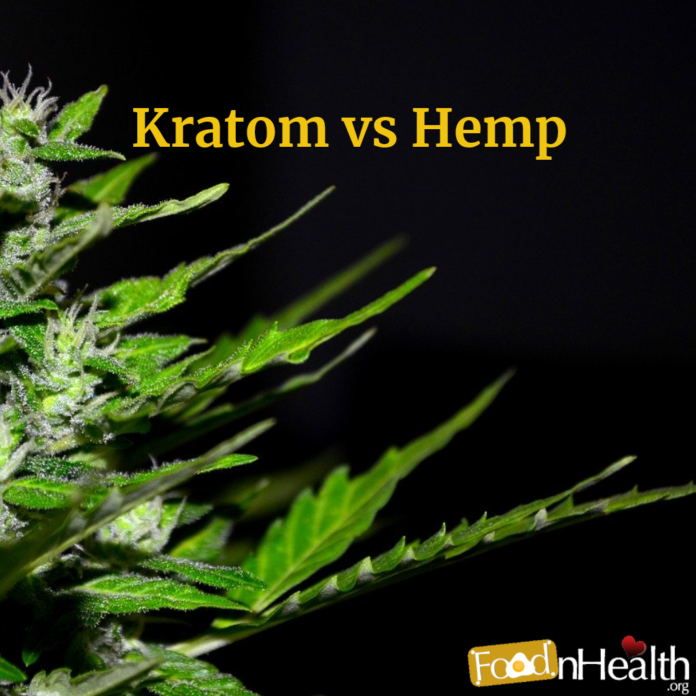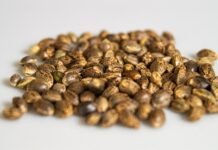With more and more people becoming aware of the dangers of synthetic medication, there’s a growing movement to more natural remedies. And because kratom and hemp are more available than ever before through websites like thegoldenmonk.com, people are starting to switch out their prescriptions for these natural, all-organic alternatives.
But if you’ve ever taken a look into both markets, you’ll find that there are a lot of similarities between both products. Working on the same symptoms and providing similar benefits, it seems that kratom and hemp serve the same purpose. So can you interchange them, or are they developed for different areas of health and well-being?
What is Kratom?
Kratom – also called mitragyna speciosa – is a tree that grows native to numerous Southeast Asian countries. Its leaves contain a compound called mitragynine and 7-Hydroxymitragynine which are said to produce opioid-like analgesic effects. In fact, these compounds interact directly with opioid receptors in the brain to induce their pain-relieving effects.
For centuries, the plant has been used as a natural pain killer and stimulant by locals in the area by chewing the leaves or brewing them like tea. Different varieties exist like yellow Vietnam kratom and maeng da kratom, and sellers claim that these distinct choices offer varying effects.
The uses of kratom center on its benefits in terms of pain relief, and its ability to assist in the treatment of opiate withdrawal. It’s a powerful herb that soothes the body at larger doses, or stimulates at lighter, lesser amounts.
What is Hemp?
Hemp comes from the cannabis plant and is closely related to marijuana. The main difference between hemp and marijuana is that they have distinct chemical compositions, with hemp containing less than 0.3% delta-9 tetrahydrocannabinol. This is the psychoactive compound found in marijuana, which is also the reason why it remains a controlled substance.
Today, cannabidiol or CBD is considered the main active ingredient in hemp, but numerous studies have found that the entire plant chemistry works together to produce what scientists call an entourage effect. Much like kratom, hemp has long been used for its benefits against pain. But unlike kratom, hemp is also known to have very mild cognitive effects. The herb produces a mental clarity that aids in the relief of brain fog, attention problems, and even stress.
Hemp is available in a wide range of products, including edibles, beverages, oils, and even pet products. The wide selection makes it possible for buyers of all needs and preferences to find a blend that’s suited for their specific situation.
Hemp and Kratom – Are They Legal?
When it comes to the issue of legality, both kratom and hemp remain legal as of writing. Although hemp was previously lumped together with marijuana as a controlled substance, it has since been cleared of the stigma by the passing of the Farm Bill. This legalized the herb nationwide, making it one of the most popular agricultural commodities in the country to date.
In 2016, kratom itself had a run-in with the DEA after they attempted to classify the herb as a schedule 1 drug. But clamor from the public, as well as from the science community, urged the Department to recant their decision. So kratom remains legal and available on a federal level.
But that doesn’t mean there aren’t any restrictions. Because hemp looks and smells just like marijuana, it’s difficult to tell them apart. And because marijuana remains illegal across most of the country, there are dangers to carrying or using hemp in public spaces. So for the most part, it would be wise to use the herb in the privacy and safety of home.
In the case of kratom, while it is legal on a federal level, there are some states that have banned the product within their borders. These include Alabama, Arkansas, Indiana, Vermont, and Wisconsin. In the same light, all members of the US Army are prohibited from using any sort of kratom product.
How are Hemp and Kratom Different?
Although it is true that both kratom and hemp share similarities, there are quite a few differences between the plants as well. Understanding what they’re ideal for should help you decide whether to use one or the other for your specific needs.
The biggest similarity between the two products is that they both address pain, but they use completely different pathways to do so. Hemp interacts with the endocannabinoid system, while kratom interacts with the opioid system.
Once in your system, cannabinoids from hemp prevent the breakdown of endocannabinoids like anandamide thus allowing the naturally produced compound to stay longer in your body and produce more pronounced effects against pain. On the other hand, kratom interacts with your opioid receptors the same way that pain killers do.
Another glaring difference is that kratom has benefits when it comes to opiate withdrawal which hemp has completely nothing to do with. That’s why many of those who are weaning off of opioids turn to kratom as a transitional substance to help minimize the symptoms of withdrawal and allow a safer transition to opioid freedom.
Finally, it’s worth mentioning that hemp is available in a wider range of products including gummies, tinctures, vape oils, cookies, candies, energy drinks, and more. Today, kratom is mainly available as a powder, kratom capsules, or just leaves which means the variety is much slimmer for the kratom market.
Hemp or Kratom – Which One is For You?
Choosing whether to use hemp or kratom really depends on your situation. As a rule of thumb, individuals treating long-term pain might be better off with hemp because it’s less likely to cause dependence. Hemp is also much better for stress, seizure disorders, Parkinsons, and cancer.
On the other hand, individuals weaning off of opioids can experience benefits with kratom. And because it’s much more potent, kratom works well as a temporary solution against acute pain. So for injuries or athletic soreness, kratom might be able to provide more palpable pain relief ideal for short term use.


























